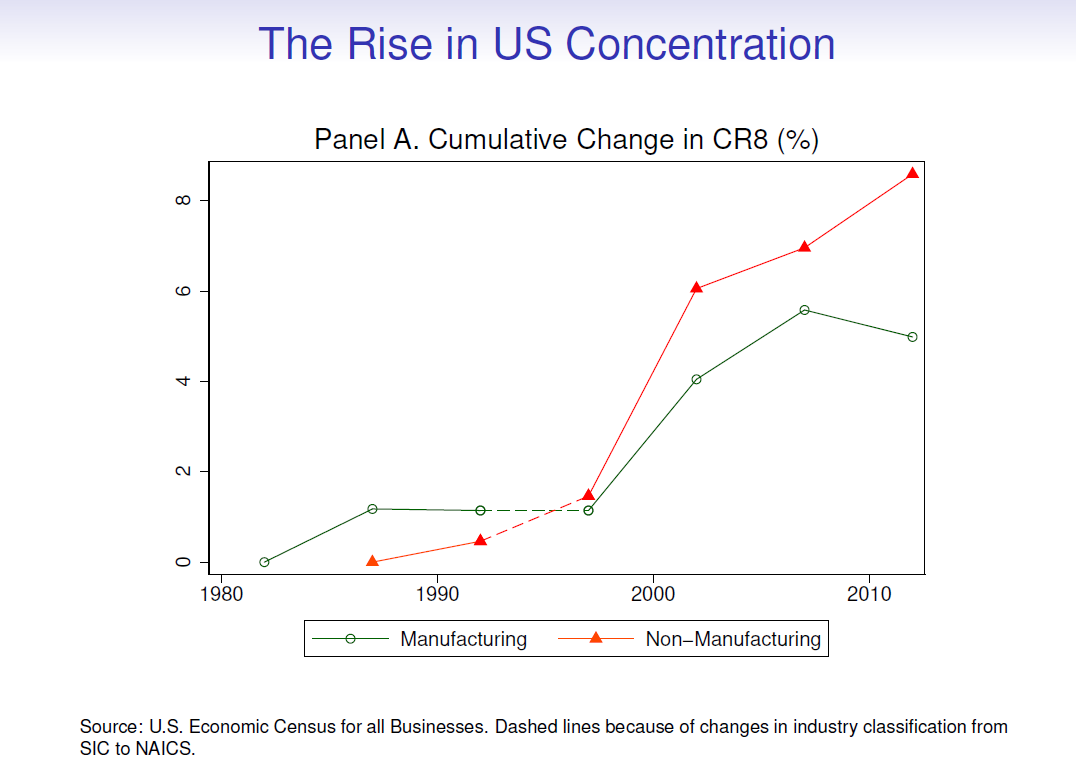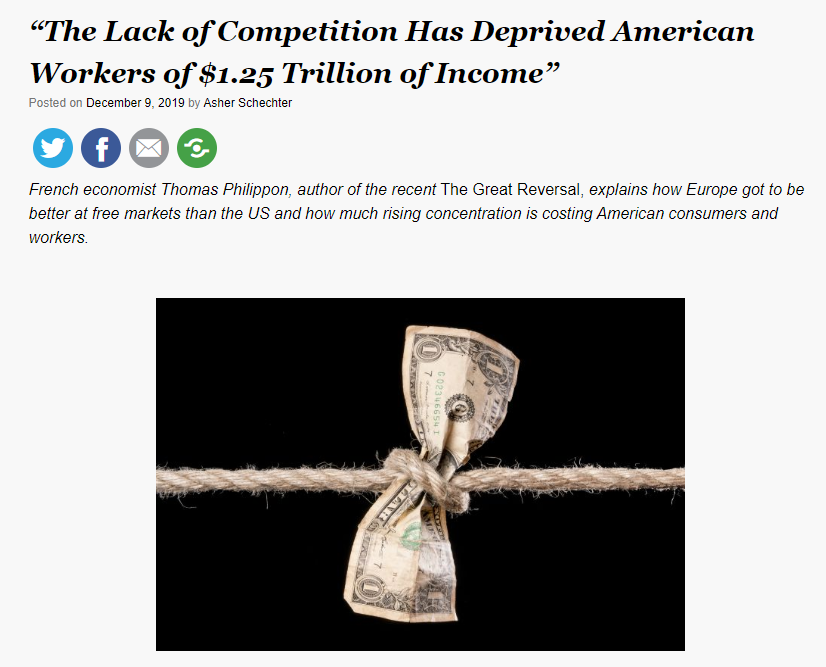Watch a Stigler Center webinar with NYU professor Thomas Philippon and Chicago Booth professor Chad Syverson on Philippon’s new book, The Great Reversal: How America Gave Up on Free Markets. The conversation is moderated by Chicago Booth professor Guy Rolnik and addresses the impact of Covid-19 on economic concentration.

Watch a Stigler Center webinar with NYU Stern professor Thomas Philippon and Chicago Booth professor Chad Syverson on Philippon’s new book, The Great Reversal: How America Gave Up on Free Markets. The conversation is moderated by Chicago Booth professor Guy Rolnik and addresses the impact of Covid-19 on economic concentration.
The United States, argues Philippon, was once a model for free markets, but has since given up on healthy competition. Every economic sector is more concentrated than it was twenty years ago, dominated by fewer and bigger players who lobby politicians aggressively to protect and expand their profit margins.
This drives up prices while driving down investment, productivity, growth, and wages, resulting in more inequality. Meanwhile, Europe—long dismissed for competitive sclerosis and weak antitrust enforcement—is beating America at its own game.
For the sake of ordinary Americans, Philippon concludes, the government needs to return to what it once did best: keeping the playing field level to enable competition.
Thomas Philippon is the Max L. Heine Professor of Finance at New York University’s Stern School of Business. Philippon was named one of the “top 25 economists under 45” by the IMF in 2014. He has won the 2013 Bernácer Prize for Best European Economist under 40, the 2010 Michael Brennan & BlackRock Award, the 2009 Prize for Best Young French Economist, and the 2008 Brattle Prize for the best paper in Corporate Finance.
Philippon has studied various topics in macroeconomics and finance: systemic risk, crisis resolution mechanisms, the dynamics of corporate investment and household debt, and the size of the finance industry. His recent work has focused on the Eurozone crisis, financial regulation, and the market power of large firms. He currently serves as an academic advisor to the Financial Stability Board and to the Hong Kong Institute for Monetary and Financial Research.
He was previously an advisor to the New York Federal Reserve Bank, a board member of the French prudential regulatory authority from 2014 to 2019, and the senior economic advisor to the French finance minister in 2012-2013. Philippon graduated from Ecole Polytechnique, received a PhD in Economics from MIT, and joined New York University in 2003.
Chad Syverson is the George C. Tiao Distinguished Service Professor of Economics at Chicago Booth. His research spans several topics, with a particular focus on the interactions of firm structure, market structure, and productivity. He also co-authored (with Austan Goolsbee and Steve Levitt) an intermediate-level text, Microeconomics. Syverson serves as an editor of the Journal of Political Economy, is a research associate of the National Bureau of Economic Research and has recently served on National Academies committees.
Prior to his appointment at the University of Chicago, Syverson was a mechanical engineer co-op for Loral Defense Systems and Unisys Corporation. He earned two bachelor’s degrees in 1996 from the University of North Dakota, one in economics and one in mechanical engineering. He earned his PhD in economics in 2001 from the University of Maryland. Syverson joined the Chicago Booth faculty in 2008.
Guy Rolnik (moderator) is a clinical associate professor of strategic management at Chicago Booth. For the last 28 years, he has lived and worked at the intersection of business, finance, regulation, politics, and the media. First, as a financial journalist and editor, later as a business entrepreneur and founder of a media company, and in the last decade as a policy entrepreneur—using media as a tool for driving structural reforms in the economy.
Rolnik’s work as a founder and chief editor of a leading business newspaper and columnist influenced in a dramatic way the ideas, norms, and values in Israel’s political economy and brought about significant changes in regulatory policies and legislation. In this process, he has gained a unique understanding of the interplay of the three worlds: business, regulation, and media.
You can download Thomas Philippon’s full slide deck here.

Also, check ProMarket’s recent interview with Philippon about his book:
ProMarket is dedicated to discussing how competition tends to be subverted by special interests. The posts represent the opinions of their writers, not necessarily those of the University of Chicago, the Booth School of Business, or its faculty. For more information, please visit ProMarket Blog Policy.







